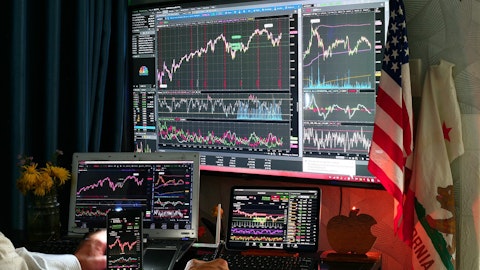CION Investment Corporation (NYSE:CION) Q1 2024 Earnings Call Transcript May 9, 2024
CION Investment Corporation beats earnings expectations. Reported EPS is $0.604, expectations were $0.41. CION isn’t one of the 30 most popular stocks among hedge funds at the end of the third quarter (see the details here).
Operator: Greetings, and welcome to the CION Investment Corporation First Quarter 2024 Earnings Call. At this time, all participants are in listen-only mode. A question-and-answer session will follow the formal presentation. [Operator Instructions] As a reminder, this conference is being recorded. It is now my pleasure to introduce Charlie Arestia, Managing Director and Head of Investor Relations at CION Investment Corporation. Thank you. You may begin.
Charlie Arestia: Good morning, and welcome to CION Investment Corporation’s first quarter 2024 earnings conference call. An earnings press release was distributed earlier this morning before market open. A copy of the release, along with the supplemental earnings presentation is available on the company’s website at www.cionbdc.com in the Investor Resources section and should be reviewed in conjunction with the company’s Form 10-Q filed with the SEC. As a reminder, this conference call is being recorded for replay purposes. Please note that today’s conference call may contain forward-looking statements, which are not guarantees of future performance or results and involve a number of risks and uncertainties. Actual results may differ materially from those in the forward-looking statements as a result of a number of factors, including those described in the company’s filings with the SEC.

Joining me on today’s call will be Michael Reisner, CION Investment Corporation’s Co-Chief Executive Officer; Gregg Bresner, President and Chief Investment Officer; and Keith Franz, Chief Financial Officer. With that, I would like to now turn the call over to Michael Reisner. Please go ahead, Michael.
Michael Reisner: Thank you, Charlie, and good morning, everyone. We reported another strong quarter this morning, continuing our momentum from 2023. The earnings power of our conservatively positioned portfolio remains robust, generating an annualized net investment income ROE of approximately 15% in Q1. Since our direct listing in 2021, CION has continued to generate a strong net investment income ROE, in line with many of our BDC peers that are trading at or above their net asset value. While our net asset value declined modestly quarter-over-quarter, driven mostly by unrealized mark-to-market adjustments in the equity portion of our portfolio, we have grown net asset value over 6% versus the same quarter last year, driven by sustained earnings, disciplined portfolio management, and accretive share repurchases.
Net investment income for the quarter totaled $0.60 per share, up sharply from $0.40 last quarter, driven by strong underlying performance of our portfolio companies and yield-enhancing provisions that we noted on our previous earnings call, and realized during the quarter. As a result, we once again out-earned our base dividend of $0.34 per share in the quarter. Given our strong distribution coverage, and outlook for the long-term earnings power of our portfolio, I am pleased to announce an increase to our quarterly base dividend to $0.36 per share, up from $0.34 last quarter. Additionally, as mentioned on our last call, we intend to declare a supplemental dividend next month. Underlying credit performance in our portfolio remained strong in Q1, with nonaccruals improving at 0.86% of fair value.
See also 27 Cheapest Housing Markets in the US and 20 States with Highest Hispanic Population Growth Rates.
Q&A Session
Follow Cion Investment Corp (NYSE:CION)
Follow Cion Investment Corp (NYSE:CION)
Receive real-time insider trading and news alerts
At a high level, we remain optimistic about the credit performance in our portfolio, with only 1% of our portfolio, risk-rated four or five on our internal risk rating scale. With recent Fed commentary suggesting that interest rates may remain elevated for longer, there is a persistent focus on closely monitoring the underlying fundamentals of our borrowers. Our portfolio remains highly diversified, and largely avoid cyclical industries that would be more susceptible, to a broader economic slowdown. Our borrowers remain fundamentally healthy with stable EBITDA trends and a weighted average interest coverage ratio of 1.98 times and weighted average leverage of 4.98 times. We remain conservatively levered on a net basis at 1.03 times, down from 1.1 times in the previous quarter, and we have ample liquidity on hand to take advantage of new investment opportunities.
We remained active repurchasers of our common stock during the quarter, buying back about 424,000 shares, at an average price of about $11 per share, for a total repurchase of approximately $4.7 million. This represents a significant acceleration from last quarter’s buyback activity. We believe our stock remains deeply undervalued, given the resilience of our credit performance, and strong operating performance. More broadly, many traded BDCs are trading at, or near the high end of their historical ranges on a price to NAV basis, potentially limiting upside for investors, while CION continues to generate an attractive, well-covered dividend yield, and offers a compelling total return opportunity. We expect to remain active in repurchasing shares in the coming quarters.
Additionally, the CION team has been active buyers of our stock. We believe is active as any BDC team, and no member of the CION management team, has ever sold CION stock. Looking at the space more broadly. Many investors and analysts have focused on the outlook for returns for BDCs, given increased competition for deals and the resulting erosion of more lender-friendly conditions. While we have certainly observed these trends in larger deals, we believe our middle market focus has generally insulated CION from the spread compression and looser covenants that have characterized larger, more commoditized deal opportunities. Just recently, CION funded a first lien term loan to a true middle market borrower with annual EBITDA of approximately $55 million at SOFR plus 7.25% with our traditional covenant package.
As we look at our origination pipeline, we continue to see ample opportunities to deploy capital at attractive spreads, to qualified borrowers across a diversified industry base. Over the last 12 months, CION has generated a total return of approximately 45%, based on the market price and reinvested dividends, versus the peer average returning approximately 30%, over the same period. On many metrics that matter for BDC investors, CION continues to perform well, which we believe justifies a valuation closer to our net asset value. With that, I’ll now turn the call over to Gregg to discuss our portfolio and investment activity. Gregg?
Gregg Bresner: Thank you Michael, and good morning everyone. Our Q1 net investment income benefited from a diverse combination of the higher floating interest rates on our loan assets, origination and transaction fees from our investment activity, and a plethora of structured yield-enhancing provisions embedded within our portfolio, such as make-wholes [ph] MOICs and prepayment premiums. We remain highly selective with new investments as market conditions change rapidly at the beginning of 2024 with the market risk on switch, being abruptly flipped as substantial capital inflows into the large-cap direct loan platforms, CLO and syndicated market vehicles has resulted in a dynamic of capital chasing transactions, particularly in the larger cap markets.
This has resulted in lower coupon spreads, higher leverage attachment levels and looser credit terms, throughout the larger capital loan markets. We have seen this dynamic creep into the upper middle market, where spreads have tightened and leverage level expectations have increased for companies with $60-plus millions of EBITDA. We continue to stick to our knitting, and focus on what we consider to be the traditional middle market; companies with $20 million to $50 million of annual EBITDA. We continue to see a nice pipeline of opportunities in this range. While competitive spread levels for new issue have trended 50 to 75 basis points, below the comparable period last year, we still believe favorable versus the 150-plus basis point compression more prevalent in the larger cap market.
We remain defensive and cautious with respect to the U.S. consumer, particularly in light of slowing GDP, and the persistence of higher interest rates and inflation levels. Traditional leverage finance M&A activity began to pick up in Q1, from the relatively subdued market levels of 2023. We continue to see refinancing and add-on acquisition activity, where additional debt capital is required that was beyond the capacity of the incumbent lender groups, or where the private equity sponsor chose to refinance and provide an additional two years to pursue M&A, or sales strategies. We expect the thaw in M&A activity to continue in 2024, as we believe buyers and sellers are more readily accepting, the higher-for-longer reality for interest rates.
We also continued our focus on identifying technically driven disruptions in the syndicated loan market, where we seek to acquire lightly syndicated first lien loan tranches at significant discounts to par, due to issues such as ratings changes, maturity extensions, exchanges or restructurings that were not suitable for the existing syndicate holders, and where we expect to have active roles in the processes that, drive the refinancing or restructuring of the investments. As we noted on our previous earnings call, we benefited from this activity in Q1 as we realized significant investment income from the repayment, refinancing and restructuring of our discounted purchase investments in PureStar, Aveline, YAK MAT and Avison Young. To quickly highlight two transactions, YAK MAT was acquired by United Rentals in Q1.
We realized significant investment income and attractive returns on our discounted first lien loan purchases, through the repayment of our take-back loan at a premium, as well as a MOIC on the preferred equity we received in conjunction, with the restructuring. Avison Young announced a comprehensive recapitalization, and deleveraging transaction that closed in Q1 of 2024, that positions the company for future growth and investment. We realized significant investment income, and an attractive return from the backstop fee and exchange of our discounted loan purchases, into debt and equity of the recapitalized Avison Young. These transactions are representative of our special situations focused where we identify opportunities to drive incremental yields to our investors through first lien investments at the top of the capital structure where we have more active involvement in driving the outcomes of the situations.
We additionally continue to utilize secured yield enhancement provisions, such as PIK features, call protection, make-whole provisions and MOICs, to incrementally enhance yields at the top of the capital structure, rather than reaching deeper into riskier capital structures, for mezzanine and equity co-investments, to achieve incremental investment yield. As a reminder, approximately 60% of our annual PIK income, is derived from highly structured situations such as our litigation finance investments, where we can attain higher yields by matching flexible PIK timing features, with strict cash flow sweeps upon collections, or through coupon structures where PIK is incremental to our cash interest. Over 80% of our PIK investments, are in portfolio companies risk-rated either one or two and 99% risk rated three or better.
Turning now to our Q1 investment and portfolio activity. During Q1, we completed an attractive mix of first lien investments. We completed private direct first lien financings for new portfolio companies alongside several of our long-term club partners with whom we had – we have completed many successful investments together. These transactions include key impact, American Family Care, [and Rydell], where we acted as either a co-leader ranger or impactful partner. We also completed refinancings and add-on investments for portfolio companies, including American Lawyer Media, OptioRx and Rogers Mechanical. The weighted average coupon for our direct investments in new portfolio companies was approximately SOFR plus 6.3% for the quarter. During Q1, we made $125 million in new investment commitments across five new and seven existing portfolio companies, of which $107 million was funded.
These investments were diversified across new and add-on opportunities with approximately 50% in direct private investments for new portfolio companies. We also funded a total of $4 million of previously unfunded commitments. We had sales and repayments totaling $207 million for the quarter, which primarily consisted of the full repayment of our debt investment in Ampac, Services Compression, Pentec, and R.R. Donnelley. The full repayments were back-ended with nearly half occurring at, or within the last several weeks at the end of the quarter. As a result, net funded investment activity decreased by approximately $96 million for the quarter. We expect the active repayment trend, to continue in 2024 as strong cash inflows into direct, and syndicated loan funds will likely fuel refinancing and repayment activity.
We are pleased with our portfolio’s continued performance as non-accruals declined slightly from 0.89% of fair value at the end of Q4, to 0.86% of fair value at the end of Q1. We removed one name, our second lien investment in TriMark Ambrosia from non-accrual this quarter as the company completed a voluntary restructuring process in Q1, as we indicated on our previous earnings call. CION was a member of the backstop Group and received a package of backstop fee, take-back debt and equity for our first lien, and second lien positions in the company. No new names were added to non-accrual this quarter. Overall, our portfolio remains defensive in nature with 84% in first lien investments, and 86% in senior secured investments. Approximately 99% of our portfolio remains risk-rated three or better.
Our risk-rated three investments, which are investments where we expect full repayment, but are either spending more engagement time and/or have seen increased risk, since the initial asset purchase increased from approximately 6.5%, to 10.4% of the portfolio. This increase was driven largely by portfolio companies where we are more actively working on merger, refinancing or recapitalization transactions that are requiring, a higher engagement level by our investment team. I will now turn the call over to Keith.
Keith Franz: Okay. Thank you, Gregg, and good morning, everyone. As Michael mentioned, we reported another quarter of strong financial results, driven by a combination of income generated from our quarterly investment activity, and yield-enhancing provisions realized within the portfolio. During the quarter, net investment income was $32.6 million or $0.60 per share, compared to $21.8 million, or $0.40 per share reported in the fourth quarter, an increase of $10.8 million, or $0.20 per share. Total investment income was $73.6 million during Q1, as compared to $60 million reported in Q4. This is an increase of $13.6 million, or about 23% from the prior quarter. This increase was driven by additional income, related to our quarterly restructuring activities, make whole payments received and prepayment premiums earned, in connection with the repayment of certain investments in our portfolio, during the quarter.
On the expense side, total operating expenses were $41 million, as compared to $38.2 million reported in the fourth quarter. The increase was driven by higher interest expense, and advisory fees when compared to the prior quarter. At March 31, we had total assets of approximately $2 billion and total equity, or net assets of $863 million with total debt outstanding of $1.07 billion, and 53.8 million shares outstanding. At the end of the quarter, our net debt-to-equity ratio, was 1.03 times, which is slightly lower than 1.1 times at the end of Q4. Our portfolio at fair value ended the quarter at $1.7 billion, down $100 million from the fourth quarter, reflecting a combination of price declines, mostly in our equity investments, and large repayments received at the end of the quarter.
The weighted average yield on our debt and other income-producing investments at amortized cost, was 12.9% at March 31, which decreased 48 basis points from 13.4% at the end of Q4. At March 31, our NAV was $16.05 per share, as compared to $16.23 per share at the end of December. The decrease of $0.18 per share, or 1.1% was primarily due to price declines in our portfolio, partially offset by over-earning our distributions, and the accretive nature of a share repurchase program during the quarter. We ended the first quarter with a strong and flexible balance sheet, with over $600 million in unencumbered assets, lower leverage relative to our peers, a strong debt servicing capacity, and solid liquidity. We had about $179 million in cash and short-term investments, and an additional $175 million available under our credit facilities, to further finance our investment pipeline and continue to support, our existing portfolio companies.
Our current debt mix, is about 60% in senior secured and 40% in unsecured, with over 85% in floating rate. During the quarter, the weighted average cost of our debt capital was about 8.4%, which is slightly down from the fourth quarter. In terms of our debt capital, we are actively working with our commercial lenders, to amend and extend our credit facilities, for an additional two to three years with more constructive provisions and better economics. We believe these new terms will give us the flexibility needed to further diversify our debt mix between secured and unsecured and to continue to expand our group of lending partners. Now turning to distributions. During the first quarter, we paid a quarterly base distribution to our shareholders of $0.34 per share, which is the same as the fourth quarter.
As a result, the trailing 12-month distribution yield through the first quarter based on the average NAV was 10%, and the trailing 12-month distribution yield, based on the quarter end market price was 14.6%. As announced this morning, we declared our second quarter base distribution of $0.36 per share, which is an increase of $0.02 per share, or about 6% from the first quarter. The second quarter base distribution will be paid on June 17, to shareholders of record on June 3. This is now the fourth time we have increased our quarterly base distribution, since we listed back in October 2021, raising the base distribution by $0.10 per share with 38% from $0.26 per share to $0.36 per share. In addition, as previously announced, we will be disclosing the amount of the midyear supplemental distribution, sometime during June.
The midyear supplemental distribution, will be paid on July 12 to shareholders of record on June 28. Okay. With that, I will now turn the call back over to the operator, who will open the line for questions.
Operator: Thank you. [Operator Instructions] Our first questions come from the line of Erik Zwick with Hovde Group. Please proceed with your questions.
Erik Zwick: Thanks. Good morning, everyone. You noted in the prepared remarks that there were a number of transactions in the quarter that drove some revenue, from realization fees and exit fees and things of that nature. Curious, if you could kind of quantify that revenue that occurred in 1Q that, would not be expected to occur in 2Q, fully understanding that there could be additional transactions going forward as well?
Keith Franz: Yes, Erik. Good morning. It’s Keith. So in terms of some of the transaction income and restructuring income that we had during the quarter, it was about between $7 million and $8 million in total.
Erik Zwick: Okay. Great. That’s helpful. And then you continue to note that you look to diversify your funding, and from that perspective, both in terms of the mix. Curious, you mentioned also desire to extend some of your current facilities, and wondering if that $30 million unsecured term loan that matures at the end of the 3Q, is one that you’re looking to extend? And then also, whether your preference today for any new kind of funding would be, if preference in terms of fixed or floating, kind of given where we are in the interest rate cycle at this point?
Keith Franz: Yes. At this point, we continue to evaluate opportunities within the capital – debt capital markets. So, we’re evaluating everything at this point. But right now, the focus is to, continue to work with our commercial banking lenders, to get those two facilities extended.
Erik Zwick: Got it. Thank you. And then last one from me. You’ve done a commendable job working down the non-accrual list over the past year. And it’s also good to see that the percentage of investments on your internal ratings that, have four or five have decreased as well. I’m actually a little bit curious about the top end of the rating scale. It looks like in 4Q, you had one or more investments that were upgraded to one. It may have been kind of downgraded maybe back, to where they were prior based on the Q1 profile. So, curious kind of what happened there in that one category?
Michael Reisner: I think – this is Michael. How are you doing? The ones – we only really upgrade something to one when we have knowledge of a loan that’s going to be exited. So we – for the reporting period. So you should expect most of our names will be two, when we do a deal and only upgrade it to one, if we have knowledge of something that’s going to happen to that name.
Erik Zwick: Got it. That makes sense. So given kind of the transactions that were reported here in 1Q, you had a pretty good sense of that in 4Q, they are upgraded. Perfect. That’s all for me today. Thank you.
Michael Reisner: Yes. Thank you.
Operator: Thank you. This concludes our Q&A session. I would now like to turn the floor back over to Michael Reisner for closing remarks.
Michael Reisner: Thank you. In closing, I just want to reiterate that CION continues to perform well, and that we believe the current discount to NAV remains unwarranted. On a total return basis, based on the market price, CION ranked in the top 10 of 42 publicly traded BDCs over the past 12 months. A similar analysis based on NAV rather than market price, places CION in the top five total return metrics over the same time period. We are focused on building a durable franchise here at CION that seeks to deliver strong results in all market environments. We look forward to speaking to you again next quarter. Thank you.
Operator: Thank you. This does conclude today’s teleconference. We appreciate your participation. You may disconnect your lines at this time. Enjoy the rest of your day.
Follow Cion Investment Corp (NYSE:CION)
Follow Cion Investment Corp (NYSE:CION)
Receive real-time insider trading and news alerts




